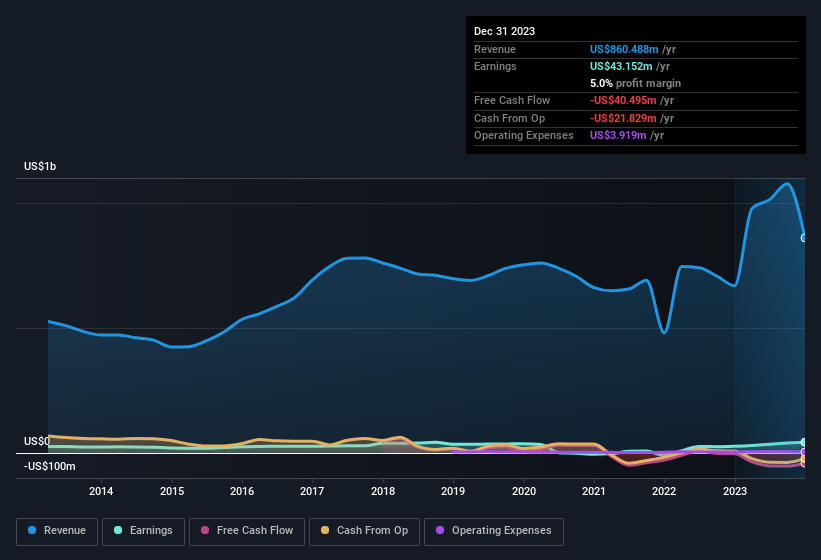- United States
- /
- Aerospace & Defense
- /
- NasdaqGS:VSEC
Investors Shouldn't Be Too Comfortable With VSE's (NASDAQ:VSEC) Earnings
VSE Corporation's (NASDAQ:VSEC) robust earnings report didn't manage to move the market for its stock. Our analysis suggests that shareholders have noticed something concerning in the numbers.
See our latest analysis for VSE

To understand the value of a company's earnings growth, it is imperative to consider any dilution of shareholders' interests. VSE expanded the number of shares on issue by 23% over the last year. As a result, its net income is now split between a greater number of shares. To talk about net income, without noticing earnings per share, is to be distracted by the big numbers while ignoring the smaller numbers that talk to per share value. Check out VSE's historical EPS growth by clicking on this link.
How Is Dilution Impacting VSE's Earnings Per Share (EPS)?
Three years ago, VSE lost money. The good news is that profit was up 62% in the last twelve months. But EPS was less impressive, up only 46% in that time. Therefore, the dilution is having a noteworthy influence on shareholder returns.
In the long term, earnings per share growth should beget share price growth. So VSE shareholders will want to see that EPS figure continue to increase. However, if its profit increases while its earnings per share stay flat (or even fall) then shareholders might not see much benefit. For that reason, you could say that EPS is more important that net income in the long run, assuming the goal is to assess whether a company's share price might grow.
That might leave you wondering what analysts are forecasting in terms of future profitability. Luckily, you can click here to see an interactive graph depicting future profitability, based on their estimates.
Our Take On VSE's Profit Performance
VSE shareholders should keep in mind how many new shares it is issuing, because, dilution clearly has the power to severely impact shareholder returns. Therefore, it seems possible to us that VSE's true underlying earnings power is actually less than its statutory profit. The good news is that, its earnings per share increased by 46% in the last year. The goal of this article has been to assess how well we can rely on the statutory earnings to reflect the company's potential, but there is plenty more to consider. If you want to do dive deeper into VSE, you'd also look into what risks it is currently facing. For instance, we've identified 2 warning signs for VSE (1 is a bit unpleasant) you should be familiar with.
Today we've zoomed in on a single data point to better understand the nature of VSE's profit. But there is always more to discover if you are capable of focussing your mind on minutiae. For example, many people consider a high return on equity as an indication of favorable business economics, while others like to 'follow the money' and search out stocks that insiders are buying. So you may wish to see this free collection of companies boasting high return on equity, or this list of stocks that insiders are buying.
New: Manage All Your Stock Portfolios in One Place
We've created the ultimate portfolio companion for stock investors, and it's free.
• Connect an unlimited number of Portfolios and see your total in one currency
• Be alerted to new Warning Signs or Risks via email or mobile
• Track the Fair Value of your stocks
Have feedback on this article? Concerned about the content? Get in touch with us directly. Alternatively, email editorial-team (at) simplywallst.com.
This article by Simply Wall St is general in nature. We provide commentary based on historical data and analyst forecasts only using an unbiased methodology and our articles are not intended to be financial advice. It does not constitute a recommendation to buy or sell any stock, and does not take account of your objectives, or your financial situation. We aim to bring you long-term focused analysis driven by fundamental data. Note that our analysis may not factor in the latest price-sensitive company announcements or qualitative material. Simply Wall St has no position in any stocks mentioned.
About NasdaqGS:VSEC
VSE
Provides aviation aftermarket parts distribution and maintenance, repair, and overhaul services for air transportation assets for commercial and government markets.
Solid track record with excellent balance sheet.
Similar Companies
Market Insights
Community Narratives




